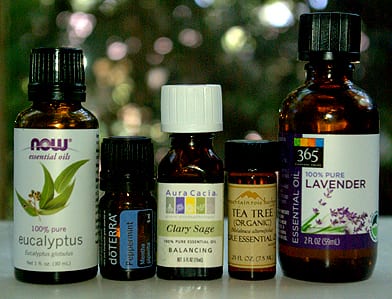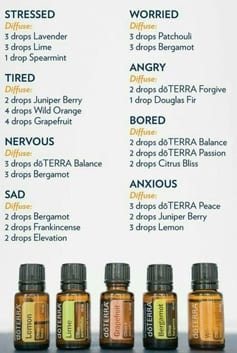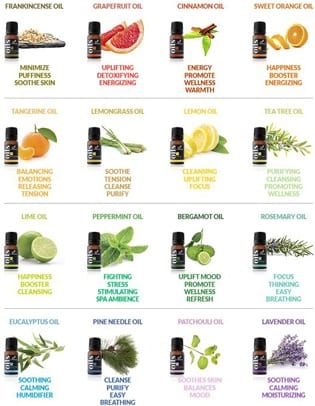Essential Oils and Your Health
Blue indicates link
There are over 90 commonly used essential oils, each associated with certain health claims. Popular oils include peppermint, lavender, and sandalwood.
Mother Nature

I would say she is the greatest provider of our well-being. For centuries, she has offered a bountiful harvest of the greatest sources for us to live a healthy lifestyle. This planet has the largest pharmacy, yet there are some of us who are guilty of not respecting her. She has her own justice system and like our legal system, justice is blind. One of us through our greed and disrespect is responsible for perhaps the babies, the children, and the many people who have followed a healthy lifestyle to be sentenced to diseases, for our reckless behavior. There are diseases, deformities, and mental and physical illnesses that may be attributed to the way we treat Mother Nature.
The Good News:
Mother nature provides us with an abundance, of ingredients that, in most cases cure ourselves. What do we have to do in return, live a respectful healthy lifestyle? I do believe in the 6 best Doctors in the World. It is so basic and yet we may complicate the very essentials to good health.

Essential Oils
Sorry friends, I may have gotten sidetracked a bit. This was the main topic, just took me a bit to get to it. Essential oils have been used for centuries along with herbal medicine. Aromatic plants in the form of oil and incense were elements of religious and therapeutic practices in early cultures worldwide. In addition, anointment with perfumes and fragrant oils was an almost universal practice. Burning incense in rituals provided a connection between the physical and spiritual—between the mundane and the divine. The word perfume comes from the Latin per, meaning “through,” and fume, meaning “smoke.” It was a common belief that contact with the divine could be achieved through the smoke of incense.
It has been estimated that 43% of people who have stress and anxiety use some form of alternative therapy to help with their condition.
Headaches and Migraines
In the 1990s, two small studies found that dabbing a peppermint oil and ethanol mixture on participants’ foreheads and temples relieved headache pain. Recent studies have also found positive effects against headaches when applying peppermint and lavender oil to the skin. It has also been suggested that applying a mixture of chamomile and sesame oil to the temples may effectively treat headaches and migraines. By the way, this is a traditional Persian headache remedy.
I just listened to a study on taking certain painkillers that cause inflammation. A common over-the-counter medication for pain, (due to legal repercussions I am unable to give you the name, sorry). Hemorrhage, vomiting, anemia, decreased hemoglobin, eosinophilia, and hypertension.
Other side effects include:
Upper gastrointestinal hemorrhage, upper gastrointestinal tract ulcer, dizziness, and dyspepsia. Please I can not emphasize, that if you are reading this you have access to the Internet. Take the time to type the name of the drug you are taking, and look for side effects.
Sleep and Insomnia
Smelling lavender oil has been shown to positively affect the sleep quality of women after childbirth, as well as patients with heart disease. One review examined 15 studies on essential oils and sleep. The majority of studies showed that smelling the oils (mostly lavender) had positive effects on sleeping habits.
Reducing Inflammation
It has been suggested that essential oils may help fight inflammatory conditions. Some test-tube studies show that they have anti-inflammatory effects. One mouse study found that ingesting a combination of thyme and oregano essential oils helped induce the remission of colitis. Two rat studies on caraway and rosemary oils found similar results. However, very few human studies have examined the effects of these oils on inflammatory diseases. Their effectiveness and safety are unknown.
Antibiotic and Antimicrobial
The rise of antibiotic-resistant bacteria has renewed interest in the search for other compounds that can fight bacterial infections. Essential oils, such as peppermint and tea tree oil, have been investigated extensively in test tubes for their antimicrobial effects. In fact, they have shown some positive results. However, while test-tube study results are interesting, they do not necessarily reflect what’s happening within your body. They don’t prove that a particular essential oil could effectively treat bacterial infections in humans.
Types of Essential Oils:
Note: For most underlined items, you may highlight and click, “Search” for more information.
Essential Oils Catalog and Prices
Lavender Oil
Derived from fresh lavender flowers, lavender oil is one of the most well-known essential oils. It appears to slow the activity of the central nervous system, improve sleep quality, promote better concentration, and help encourage hair regrowth in those suffering from alopecia areata, a type of hair loss. Lavender may also help fight anxiety. In one study, encapsulated lavender oil was found to be effective for generalized anxiety disorder, without sedative effects or potential for abuse.
Eucalyptus Oil
Eucalyptus oil, derived from the leaves of Eucalyptus Odorata, a smaller variety of eucalyptus trees, is a powerful biocide. It’s antimicrobial, insecticidal (kills insects), herbicidal, acaricidal (kills ticks and mites), and nematicidal (kills nematodes). It’s especially effective against the bacterial strains Staphylococcus aureus, Haemophilus influenza, Staphylococcus agalactiae, and Streptococcus pneumonia.
Eucalyptus oil is great for respiratory health. Inhaling eucalyptus steam can help alleviate cough and congestion. The aroma of the oil acts as an expectorant, helping to loosen phlegm in the nasal passages and lungs. In one study, researchers found that the combination of eucalyptus oil and peppermint oil boosts cognitive performance. The same study also found the scent of these two essential oils reduces headaches and promotes mental and muscular relaxation.
Peppermint Oil
Peppermint oil can help alleviate nausea, headache, upset stomach, gas, indigestion, and anxiety. It works on the digestive system by speeding up the rate of elimination. Peppermint oil calms the involuntary smooth muscle of the stomach, producing an antispasmodic effect, and improves the flow of bile. It can help soothe discomfort associated with irritable bowel syndrome (IBS) and studies have shown that encapsulated peppermint oil can reduce IBS symptoms in as many as 80% of people who take it.
Peppermint oil is effective because it contains menthol that interferes with the movement of electrolytes across cell membranes, stopping involuntary contractions. Beyond digestive help, peppermint oil may offer relief for HSV-1 (Herpes simplex) outbreaks by permeating the skin and acting as a virucide directly on the virus. More research is needed, but preliminary results suggest topical application may fight outbreaks.
Tea Tree Oil
Tea tree oil is another essential oil with strong antimicrobial properties. Also, known as melaleuca oil, tea tree oil comes from “tea” or “paperbark” trees. In Australia, it has a long history of use as an antiseptic. Bundjalung aborigines native to Australia inhaled the aroma of crushed leaves to relieve cough and used poultices to help heal wounds. Today, we know that tea tree oil is antibacterial, anti-fungal, antiviral, and antiprotozoal. It fights harmful organisms by damaging cell membranes.
Tea tree oil also inhibits the growth and sporulation of yeast and fungus. The oil can be applied topically to cuts to discourage infection. Like peppermint oil, tea tree oil seems to have an effect on HSV-1. One study revealed that, while topical tea tree oil doesn’t prevent recurrent herpes outbreaks, it may reduce the viral load by up to 98.2%.
Jojoba Oil
Jojoba oil is derived from the seeds of the wild jojoba shrub, a small, woody desert plant native to Arizona, California, and northwestern Mexico. Historically, Native Americans used jojoba oil to help wounds heal. Jojoba oil contains unique fatty acids and fatty alcohol esters that are similar, but superior, to those found in sperm whales. Unlike other essential oils, jojoba oil is not a volatile oil, but still offers plenty of benefits, primarily to the skin.
With respect to wound healing, researchers found that jojoba oil accelerates the closure of wounds at a cellular level. To improve skin appearance and reduce acne, incorporate jojoba oil into your skincare routine. Evidence indicates that clay-jojoba oil facial masks might be an effective remedy for mild acne.
Blue Chamomile Oil
Blue chamomile oil is extracted from German chamomile. The vibrant color of blue chamomile oil is a result of the steam extraction process — the azulene content in the oil darkens to an inky blue, brilliant azure, or deep green. This color fades and turns dark yellow during storage, but, don’t worry, the oil’s benefits don’t fade. Chamomile has been used therapeutically for thousands of years by Greeks, Romans, and Egyptians to remedy everything from skin conditions and injuries to fever and insomnia. As a traditional medicine, blue chamomile oil may help with eczema, wounds, bruises, burns, canker sores, mastitis, and other conditions.
Chamomile is also appreciated for its anti-inflammatory effects. One study found that chamomile inhibits and prevents a chemical process in the body that incites inflammation. Further, chamomile seems to inhibit the effects of the stomach-ulcer-provoking bacteria Helicobacter pylori. Inhaling the aroma of chamomile oil produces a mild sedative effect on the brain, which makes you feel sleepy. Like lavender, chamomile oil offers a mild anti-anxiety effect for those who suffer from a generalized anxiety disorder.
Rose Oil
Rose oil is a floral-scented essential oil derived from the petals of several species of rose. In contrast, rose absolute is not an essential oil because the essence of the rose is extracted using a more intense chemical extraction process. Like other essential oils, rose oil promotes a calm mood and fights harmful organisms. It contains tocopherol (a vitamin E compound), carotene, and high levels of phenolic compounds. Rose oil can make your skin more permeable so it’s often added to skin care products to improve efficacy.
Oregano Oil
Oregano oil contains carvacrol, a powerful organic compound with a long list of beneficial properties, including fighting harmful organisms. Carvacrol also supports liver health.
Jasmine Oil
Jasmine oil is derived from jasmine flowers. While many of the essential oils mentioned are sleep aids and relaxants, jasmine oil has a stimulating effect. When applied topically, jasmine oil increases alertness, breathing rate, and vigor. These effects may promote an uplifted mood and a better sense of well-being.
Copaiba Oil
This oil is extracted from the Amazonian plants in the Copaifera genus. The oil contains Copalic acid, which seems to halt the growth of common, but harmful, dental bacteria such as Streptococcus pyrogens, Streptococcus salivarius, and Streptococcus mutagens. Copaiba oil also has strong anti-inflammatory effects. Unlike most essential oils, copaiba oil can be taken orally.
Bergamot Oil
Bergamot oil is known for its calming effects, but it may also encourage a healthy body weight and help with vascular and heart health. Researchers aren’t yet sure how, but bergamot oil encourages normal cholesterol levels and blood sugar.
Neroli Oil
Neroli oil is derived from the blossom of Citrus aurantium, also known as the bitter orange tree, which is native to tropical and subtropical Asia. The oil goes by many names but is frequently called “orange bitters” and “Seville orange.” It’s known as Neroli because a 17th-century Italian princess, Anne Marie Orsini of Nerola, took a liking to the scent. Neroli oil is commonly added to diet pills due to its ability to act as an appetite suppressant. One of the major benefits of Neroli oil is that it helps relieve symptoms associated with menopause and stress. It also boosts the actions of the endocrine system, fights harmful organisms, and soothes irritation.
Lemon Balm Oil
Also called Valerian, lemon balm is another essential oil that helps with symptoms of menopause, especially disordered sleep patterns. Lemon balm also seems to sharpen memory and boost problem-solving abilities. Some promising research indicates that it may improve recall for people with Alzheimer’s disease.
Pomegranate Oil
Pomegranate oil comes from the many seeds of the pomegranate. It’s exceptionally rich in linolenic acid, an essential fatty acid. Some research suggests pomegranate oil may even delay the development of colon cancer and skin cancer. The oil also enhances the immune system.
Frankincense Oil
Frankincense oil is extracted from the Boswellia tree sap and has a long history of therapeutic use. Most interestingly, frankincense promotes normal cell growth
How to Use Essential Oils ( PRECAUTIONS )
Most essential oils are safe to use, but you have to pay attention to their intended use and stick to those applications. Some oils can only be used aromatically and should not be applied to the skin or taken orally. You may have noticed that many of the oils are effective against harmful organisms. Those effects aren’t always limited to harmful organisms — they might affect gut and skin microbiota, too. Others can kill cells indiscriminately, including normal tissue cells.
There are, of course, gentle essential oils that are great for the skin. Neroli oil, for example, promotes circulation and soothes irritation. Rose oil moisturizes the skin and is used as a gentle toner. To take advantage of some skin benefits of essential oils, AquaSpirit contains Neroli, rose, jasmine, and lavender oil. It encourages healthy-looking, radiant skin and promotes well-being.
IN A NUTSHELL
Peppermint: Used to boost energy and help with digestion.
Lavender: Used for stress relief.
Sandalwood: Used to calm nerves and help with focus.
Bergamot: Used to reduce stress and improve skin conditions like eczema.
Rose: Used to improve mood and reduce anxiety.
Chamomile: Used for improving mood and relaxation.
Ylang-Ylang: Used to treat headaches, nausea, and skin conditions.
Tea Tree: Used to fight infections and boost immunity.
Jasmine: Used to help with depression, childbirth, and libido.
Lemon: Used to aid digestion, mood, headaches, and more.
WARNING’S CERTAIN INDIVIDUALS MAY HAVE SIDE EFFECTS
ALWAYS CONSULT WITH YOUR DOCTOR FIRST
The oils that have most commonly been associated with adverse reactions are lavender, peppermint, tea tree, and ylang-ylang.
Oils that are high in phenols, such as cinnamon, can cause skin irritation and shouldn’t be used on the skin without first being combined with a base oil.
Eating essential oils is not recommended, as it could potentially be harmful and in some doses fatal.
Very few studies have examined the safety of these oils for pregnant or breastfeeding women, who are usually advised to avoid them.
Essential oils are generally considered safe. However, they may cause serious side effects for some people, especially if applied directly to the skin or ingested.
These oils are generally considered safe to inhale or apply to the skin, as long as they’ve been combined with a base oil. They should not be eaten.
In case, you have a serious health condition or are taking medication, you should discuss their use with your doctor.


More information and images.
Thank you
Michael
Comments are Welcome.
I adore my Essential oils and I buy mine through a company called Melaleuca as their products are pure and reasonably priced as well
I use tea tree whenever I feel a bit of a cold coming and I also put it in the rinse water when bathing my wee dogs as it is so good and fleas hate it
I burn lavender oil in my melaleuca burner and it’s so calming. Essential oils as you say have incredible healing benefits and thank you so much for sharing today
This is awesome Vicki. I have to check out Melaleuca and their products.
So glad the tea tree oil helps you avoid a cold and the benefits your wee dogs are getting from a flea free life.
Lavender in any form seems to have this calming effect even helping people suffering from insomnia.
Thank you Vicki for taking the time to comment.
All the best,
Michael
Thank you for the list of benefits on essential oils. I have essential oil diffusers, one in my bedroom and one in my office. They help me calm and stay focus. I also use some tea tree oil and mix it with my shampoo and conditioners for the cool effects and the smell, it helps with my stress tremendously.
I had no idea that peppermint oil can help with migraine, I will share your tip to my sister, she always suffered from that since she was a teenager. Currently she is using CBD. But it doesn’t hurt to give peppermint oil a try 🙂
The summary below is awesome, I think I am going to need sandalwood for my focus, I just dozed of a bit reading your post, omg.
Cheers to the Mother Nature!
Hi Nuttanee, thank you for taking the time to comment on my essential oil page. If CBD oil is working for your sister in helping her with her migraine’s, this is great. Just make sure that the peppermint oil will work with CBD.
I am glad to hear you are aware of the benefits of essential oils. I too use it with my shampoo. Leaves a nice glow.
Thank you very much and all the best,
Michael
I am so grateful to the great Dr okosun for curing my herpes disease,for 4 years i have been having hsv 1&2 which made me look so horrible, since i have been having this disease i have been in a complete agony weeping everyday, i have gone to several places trying to get a cure but nothing was changed, i came to the internet one day and decided to look for help online and i saw different testimonies from various people around the world on how they have been cured from various diseases by this Dr okosun and i also decided to contact him through his whatsapp number and i told him i have been infected with hsv and he assure me that he will help me to get cured from my disease, i believed him and obeyed all his instruction that he gave to me, afterwards he prepare a cure for me and when i received it and started using it just as he has promised me, i was told i will be cured from my infections within four weeks if i follow as i was instructed and i did as i was told and after four weeks i went for check up and to my greatest surprise i was declared negative and i was still in doubt and i waited for another week and went for check up in another hospital in another city and i was still declared negative, that was how i was completely cured totally within four weeks of usage. and i know there are also people out there suffering from various infections, why dont you contact dr okosun and get healed, you can get intouch with dr okosun via: drokosun55@gmail.com or watsapp on +2348124363791
His website https://drokosun55.weebly.com
Hi Robin, thank you for sending me the link, much appreciated.
I hope you are doing well.
All the best,
Michael
Using herbal natural remedy was what got me tested negative to HSV 2 after been diagnosed for years.I have spend so much funds on medications like acyclovir (Zovirax), Famciclovir (Famvir), and Valacyclovir (Valtrex But it was all a waste of time and my symptoms got worse To me It is very bad what Big pharma are doing, why keep making humans suffer greatly just to get profits annually for medications that doesn’t work.I’m glad that herbal remedies is gaining so much awareness and many people are getting off medications and activating their entire body system with natural herbal remedies and they are become holistically healed totally.